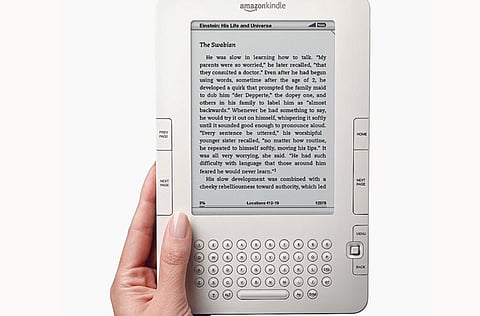Apple tablet's added features could lure publishers from Kindle
New device allows users to create more interactive content, research analyst says

San Francisco: Apple's planned tablet computer is luring publishers with features that Amazon.com's Kindle and Sony Corp.'s electronic readers lack, such as colour photos, video and author interviews, analysts said.
Hearst Corp., McGraw-Hill Cos. and Hachette Book Group have held talks about featuring their content on Apple's tablet, expected to be unveiled this week, according to people familiar with the matter.
The device will allow publishers to create more interactive content, said James McQuivey, an analyst at Forrester Research in Cambridge, Massachusetts.
"Apple is in a killer position," McQuivey said. "The majority of reading we do cannot be done on current e-readers.
"The Apple tablet will be first to make the claim that you can read everything from Sesame Street to Dan Brown to the Atlantic to the Denver Post, all on the same device."
Amazon.com's Kindle and Sony's e-readers, which dominate the market today, have black-and-white screens and can't display video.
Revenue sources
Apple's device will let publishers tap new sources of revenue by offering premium features to an audience that is deserting print publications for the internet, said Rich Maggiotto, chief executive officer of Zinio LLC, a San Francisco-based distributor of digital books and magazines.
McGraw-Hill will "undoubtedly" have an e-book in response to Apple's rumoured tablet, CEO Terry McGraw said on Tuesday on a conference call. He didn't provide further details.
Apple CEO Steve Jobs said on Monday that the company will introduce "a major new product that we're really excited about". The company was expected to hold the event yesterday in San Francisco.
Steve Dowling, a spokesman for Cupertino, California-based Apple, declined to discuss unannounced products, saying the company doesn't comment on rumours and speculation.
The company also reported a 50 per cent increase in first-quarter profit to $3.38 billion (Dh12.4 billion), topping analysts' estimates. Sales advanced 32 per cent to $15.7 billion.
Plastic Logic and Skiff, a start-up backed by Hearst, plan to sell e-readers this year that are designed for newspapers, magazines and professional documents. So far, many devices on the market have fallen short of what those publishers want, Maggiotto said.
Newspapers lost an average 11 per cent of daily circulation in the six months ended in September, according to data compiled by the Audit Bureau of Circulations.
Advertising revenue for US newspapers fell 28 per cent in the third quarter, according to the Arlington, Virginia-based Newspaper Association of America.
"One day there will be very little newsprint," said Sandy Schwartz, president of Cox Enterprises's Cox Media Group, which oversees the operations of four daily newspapers, including the Atlanta Journal-Constitution.
"My hope is that someday soon there will be a tablet that can do everything: GPS, telephone, advertising."
While the e-reader market isn't large enough yet to significantly boost publishers' revenue, the Apple tablet may increase the popularity of e-readers over the longer term, said Randy Bennett, senior vice president of public policy for the Newspaper Association of America.
Reinventing content
About six million e-readers will be sold this year, up from three million last year, Forrester estimates.
Amazon.com's Kindle has about 60 per cent of the market, while Sony's products have 35 per cent, Forrester says.
Drew Herdener, a spokesman for Seattle-based Amazon.com, declined to comment, as did Kyle Austin, a spokesman for Tokyo-based Sony.
It's unrealistic to think that new devices alone will transform the industry, Maggiotto said. Publishers will also have to invest in creating content that is unique for these devices, he said.
"It's one thing to shovel print content onto a screen," he said.
"It's another thing to think about how to reinvent your content for that medium. That's the publisher's responsibility."
The Apple tablet will also have a back-lit screen, which will drain the battery more quickly than current electronic readers, and it may cost more, McQuivey said.



